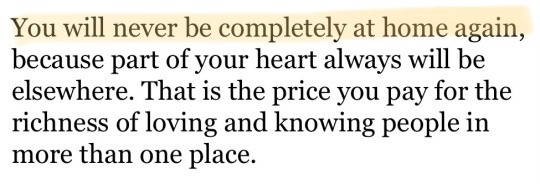Text
A1-A2: man, there're so many words I need to know in order to say literally anything
B1-B2: wow, what I know is enough now
C1-C2: man, there're so many weirdly specific words I need to know in order to describe these weirdly specific things I've only seen once in my life. Also I forgot how to say ceiling.
5K notes
·
View notes
Text
Korean Financial Terms #1
Hey there~ I've been studying financial terms in Korean and wanted to share some of the vocabulary with you all!
Bank: 은행
Bank Account: 은행 계좌
Budget: 예산
Cash: 현금
Credit Card: 신용카드
Debit Card: 직불카드, 현금카드
Stock: 주식
Stock Market: 주식 시장
Investment: 투자
Interest Rate: 이자율
Asset: 자산
Dividend: 배당금
Bond: 채권

#korean#korean vocab#korean vocabulary#korean vocab list#korean vocabulary list#korean financial terms#my content
7 notes
·
View notes
Text
Hanja Lesson: 과
안녕하세요 여러분! Here’s another Hanja lesson that I recently posted on my Instagram–this one’s about 과! I hope it’s helpful :) 화이팅!
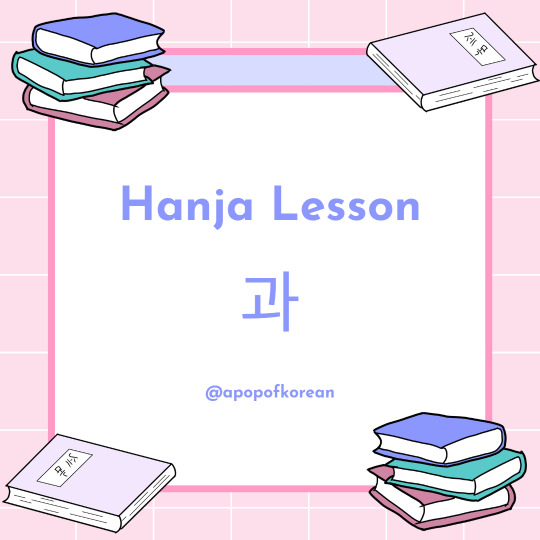



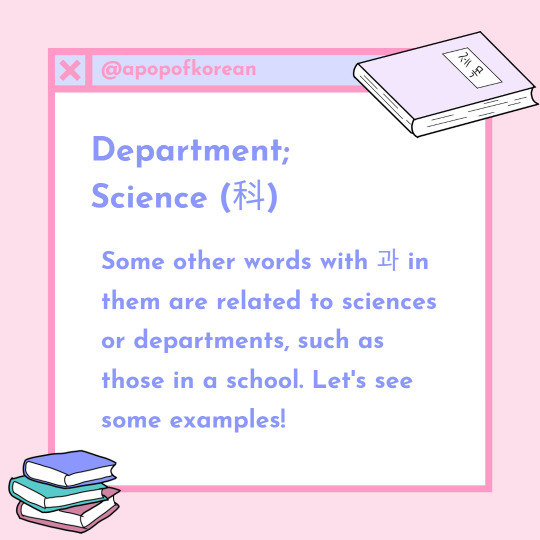
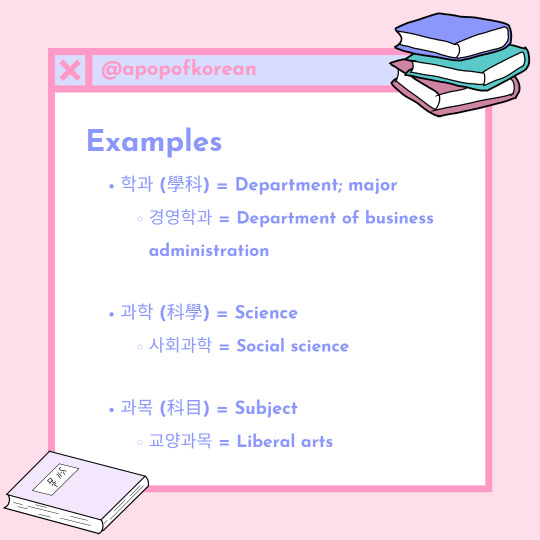


My masterlist
Join my Discord chat here to practice Korean with others!
Follow me on Instagram here for more Korean content!
Check out my Ko-Fi to support this blog and my studies! Thank you for your generosity!
93 notes
·
View notes
Text
Vocab List Templates #2
(link to template #1)
Here’s a vocab list (based on this post) you can fill in with your own target language(s). There’s also an empty vocab list at the end in case you find additional words i missed in my lists. I’ll upload more lists with the rest of the vocab words from the post above soon too!
-> here’s a link to a Google Drive folder with the pdf files if you prefer that format
Feel free to post & share your filled-in lists for other language learners!



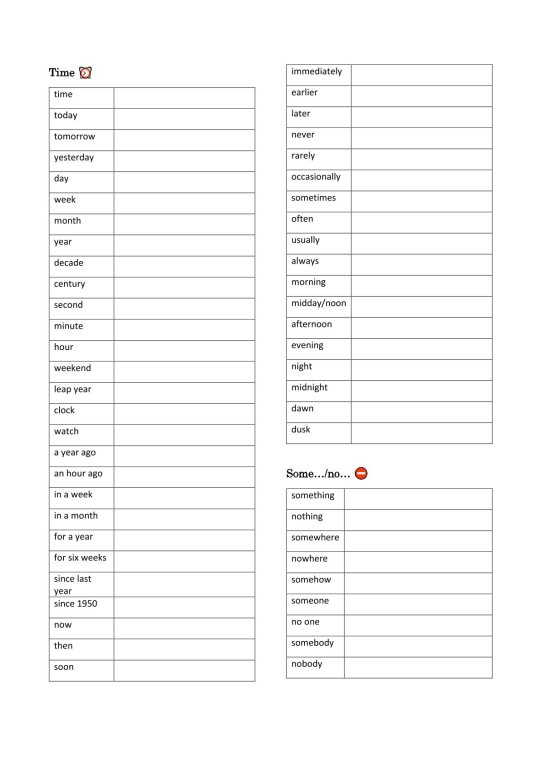
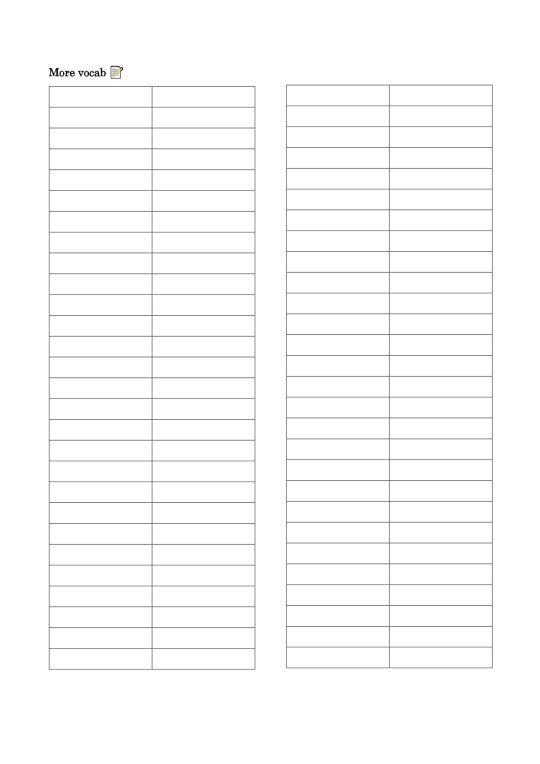
205 notes
·
View notes
Text
Hello! I never introduced myself here, because this was just a place for me to collect resources for my language learning process. But I haven’t been here for a long time and I want to be more active from now on, so here we go!
I’m June and I’m a language student. My native language is Turkish, I can speak English fluently and I’m decent at Korean, though speaking is still difficult for me.
I’ve been in Korea for a few months now!

I’d like to talk about my goals for 2023 next~
My first goal is achieving TOPIK 5-6급. I have been studying Korean for years now but I feel like I have never taken it seriously enough. I plan to study regularly this semester (after resting well, of course).
My next goal is to publish a monthly digital magazine. I still have many doubts, mainly because I don’t really put myself out there, so publishing a magazine and asking people to read it sounds scary, but I should stop being afraid of everything. I do not want to live my life this way, so I’m forcing myself to come out of this shell I built long ago.
Then, I’d like to learn a fourth language. It’s probably going to be Japanese. I am not ambitious about it, I just want to learn a new language.
I also want to finish reading a book in Korean. I bought the Korean copy of Omniscient Reader's Viewpoint, and one of my friends gifted me the Korean copy of The Little Prince. I’m hoping to complete reading them!!

Thank you for reading! ~
4 notes
·
View notes
Text
All Things Linguistic - 2021 Highlights
2021 was in many ways a very meta year: most of my writing projects were reflections on the social functions of various other projects I was working on. But those other projects were very interesting both to do and to reflect on, such as coordinating LingComm21: the first International Conference on Linguistics Communication, and redesigning the Lingthusiasm website. (Might they also reflect how under-socialized I got by a certain point in this pandemic? Hmmm.)
I was honoured to be the recipient of the Linguistics, Language, and the Public Award from the Linguistic Society of America in 2021. I put up my acceptance speech as a blog post.
Media and crossovers
How Linguistics Can Help You Learn a Language – I did a talk for Duolingo’s DuoCon
Why do adults…over 40….use ellipses…so much? Crossover with Tim Blais of Acapella Science
xkcd Tower of Babel
Why Shakespeare Could Never Have Been French (video with Tom Scott)
PUZZLE SPOILERS: A quote from Because Internet in the New York Times acrostic
Someone made a crossword puzzle of Because Internet!
Peeking face, palm up, and palm down – the emoji I proposed with Lauren Gawne and Jennifer Daniel are now officially in Unicode 14.0 and will be coming to your devices in the next few years
Media
BBC Word of Mouth – The Shipping Forecast
I’m cited in a Wikipedia article about boomerspeak
I’m quoted in a New York Times Wordplay piece about ending texts with a period.
Lauren Gawne and I did a Lingthusiasm crossover appearance on the NPR show Ask Me Another, featuring two fun quiz segments, one on accepted or rejected emoji and one on famous book titles
Crash Course Linguistics
The final three videos of Crash Course Linguistics came out in 2021, although it was largely a 2020 project. Here’s the full list again so they’re all in once place, or you can watch them all at this playlist.
What is linguistics?
What is a word? Morphology
Syntax 1: Morphosyntax
Syntax 2:
Semantics
Pragmatics
Sociolinguistics
Phonetics 1: Consonants
Phonetics 2: Vowels
Phonology
Psycholinguistics
Language acquisition
Language change and historical linguistics
World Languages
Computational Linguistics
Writing Systems
Each video also comes with a few companion links and exercises from Mutual Intelligibility and a list of all of the languages mentioned in Crash Course Linguistics is here. It was great working with the large teams on that project!
Lingthusiasm
In our fifth year of Lingthusiasm, a podcast that’s enthusiastic about linguistics which I make with Lauren Gawne and our production team, we did some general sprucing up, including a new cover photo (now featuring a jacketless Because Internet), a new portrait drawing, and a new website (for which I wrote a long meta process post here). We also did our first virtual liveshow (as part of LingFest), introduced new bouba/kiki and what the fricative merch, and sent patrons a Lingthusiastic Sticker Pack. Here are the main episodes that came out this year:
Where to get your English etymologies (transcript)
Cool things about scales and implicature (transcript)
Corpus linguistics and consent – Interview with Kat Gupta (transcript)
That’s the kind of episode it’s – Clitics (transcript)
Are you thinking what I’m thinking? Theory of Mind (transcript)
A Fun-Filled Fricative Field Trip (transcript)
Making machines learn Fon and other African languages – Interview with Masakhane (transcript)
Not NOT a negation episode (transcript)
R and R-like sounds – Rhoticity (transcript)
How linguists figure out the grammar of a language (transcript)
Listen to the imperatives episode! (transcript)
Writing is a technology (transcript)
And here are this year’s bonus episodes:
Linguistics puzzles for fun and olympiad glory
Linguistic 〰️✨ i l l u s i o n s ✨〰️
Lingwiki and linguistics on Wikipedia
Q&A with Emily Gref from language museum Planet Word
Sentient plants, proto-internet, and more lingfic about quirky communication
Language under the influence
Gotta test ‘em all – The linguistics of Pokémon names
Lingthusiasm liveshow: The listener talks back (on backchannelling)
Talking to babies and small children
The episode-episode (reduplication)
Conferences and Talks (all virtual unless noted)
Planet Word, the new language museum in Washington DC, about internet language and Because Internet
Slate’s Future Tense about the meaning of emoji with Jennifer Daniel.
I moderated a panel for the European Chapter of the Association for Computational Linguistics (EACL) on NLP Applications for Crisis Management and Emergency Situations.
Contestant on Webster’s War of the Words, a virtual quiz show fundraiser for the Noah Webster House, and also attended online conferences,
guest interview about internet language on That Word Chat (summarized in tweet form)
The Internet is Making English Better at Yale with Claire Bowern
Internet Linguistics and Memes as Internet Folklore with a student at the University of Oklahoma
Sotheby’s Level Up in Los Angeles (physical)
Unicode Conference in the San Francisco Bay Area (physical), where I did a keynote called “Taking Playfulness Seriously – When character sets are used in unexpected ways” (slides here!).
The Unicode talk isn’t online but a few days later I did a talk on the same topic for Bay Area NLP, for which the video is here.
Virtual talk for some internal folks at YouTube
Rosemary Mosco Talks to Gretchen McCulloch about Pigeons, a book event at Argo Bookshop
Conferences/events attended:
Linguistic Society of America (LSA) – did a Wikipedia editathon
American Association for the Advancement of Science (AAAS)
Dictionary Society of North America conference
Annual meeting of the Canadian Linguistics Association
WorldCon (physical)
LingComm and LingFest
In April, I co-organized a pair of new events related to linguistics communication: LingComm21, the first International Conference on Linguistics Communication, and LingFest, a fringe-festival-like program of online linguistics events aimed at a general audience, which contained a total of 12 events attended by a total of over 700 participants. One of those events was our first virtual Lingthusiasm liveshow: here’s a fun thread that I did about backchannels while we were getting ready for the show.
LingComm21 had just under 200 registrants, around 100 of which were formally part of the programming in some way. My opening remarks and closing remarks are here as blog posts, and see the #LingComm21 hashtag for highlights of what people noticed about the conference. We then wrote a 6-part blog post series on the conference as a case study in making online conferences more social, in hopes of helping other people who are interested in better virtual events.
Why virtual conferences are antisocial (but they don’t have to be)
Designing online conferences for building community
Scheduling online conferences for building community
Hosting online conferences for building community
Budgeting online conferences or events
Planning accessible online conferences
Okumaya devam et
251 notes
·
View notes
Note
can you explain more how to use 아/어 가지고? thank you!
Sure! So 아/어 가지고 is a grammar point used to express the reason for something. The cause and effect. So, it is normally translated as “because,” but it can be translated in a number of ways.
It is used with mostly verbs (동사) and adjectives (형용사). But it is not conjugated for tense, so no tense markers are used with it.
아 가지고 comes after words that end with ㅏ and ㅗ. The same as making a simple present tense sentence (가요, 좋아요).
사다 -> 사 가지고, 좋다 -> 좋아 가지고, 오다 -> 와 가지고
어 가지고 comes after words that don’t end with ㅏ or ㅗ.
먹다 -> 먹어 가지고, 쓰다 -> 써 가지고, 배부르다 -> 배불러 가지고
Then 하다 verbs and adjectives get attached with 여, right? But it becomes 해.
하다 -> 해 가지고
Here are some examples with verbs:
어젯밤에 너무 많이 먹어 가지고 아직도 배부르다. Because I ate so much last night, I’m still full. (I ate so much last night that I’m still full.)
오늘 늦잠을 자 가지고 샤워를 못 했다. Because I woke up late, I couldn’t take a shower. (I woke up late, so I couldn’t take a shower.)
내 지갑을 못 찾아 가지고 학교에 지각했다. Because I couldn’t find my wallet, I was late to school. (I couldn’t find my wallet, so I was late to school.)
Here are some examples with adjectives:
오늘은 날씨가 좋아 가지고 밖에 나가고 싶네. Because the weather is nice today, I want to go outside. (The weather is so nice that I want to go outside.)
나는 키가 작아 가지고 콤플렉스가 있다. Because I’m short, I have a complex (about it).
남자랑 사귀어 본 적이 없어 가지고 어떨지 잘 모르겠다. Since I don’t have the experience of dating a man, I don’t know what it would be like. (I’ve never dated a guy before, so I don’t know what it’d be like.)
You can technically use this form with a noun. But it isn’t common. You’re more likely to see 이어서 or (이)라서 used with nouns, even 이기 때문에.
오늘은 친구 생일이어가지고 선물을 사러 가는 중이야. –> 오늘은 친구 생일이어서 선물을 사러 가는 중이야. Because it’s my friend’s birthday, I’m on my way to buy a gift.
아/어 가지고 can also be used to express a sequence of events that are connected. So, it is often seen as “and (then).” It has the same conjugation rules as the other translation. But it’s usually used with verbs since it shows a sequences of events (actions).
집에 가 가지고 먹었다. I went home and (then) ate.
우리 친구네 집에 가 가지고 공부할 거다. I’m going to go to my friend’s house and (then) study.
친구한테 전화 해 가지고 물어 볼 거다. I’m going to call my friend and (then) ask.
But the events must be connected actions. So, let’s look at a bad/unnatural example. “학교에 가 가지고 장보러 갈 거예요. I’m going to go to school and then go grocery shopping.” This does not work because going to school has nothing to do with grocery shopping. They are unrelated activities unless you’re grocery shopping at the school. So, the two clauses must be related to each other.
Usage notes:Before writing this post, I had a very practical discussion with my friend on this grammar point. And we both agree that this grammar point is used all day while speaking. It’s used in informal writing like text messages and blogs, so you will not find it on the news or in formal writing. Which also means it’s also typically used between friends, family members, and romantic partners. It’s not as common in the workplace, except on some occasions. And that exception was that it can come off a little cute and softer than 아/어서 does when you make a mistake or have to tell someone something they don’t want to hear.
So, if I was to say to my boss “죄송해요. 그 서류를 못 찾아가지고요…” (I’m sorry. Because I can’t find that document…). It would sound a lot softer than “그 서류를 못 찾아서요.” which is a bit stiff and emotionless in comparison. So, it could help deliver the sincerity of your apology.
I hope this is helpful.^^
82 notes
·
View notes
Text
Intermediate / Lesson 30: -아/어 가지고
안녕하세요! Hey everyone! Today we’re going to learn about a grammar point that you prob hear a lot in everyday spoken Korean – -아/어 가지고! Let’s start!
What is -아/어 가지고?
-아/어 가지고 is attached to verb/adjective stems and essentially means “because” or “and then” depending on the situation. It’s very similar to -아/어서, which means the same thing! The difference is that -아/어 가지고 is a colloquialism, so it’s only used in very casual situations. In situations where you speak formally or politely, use -아/어서, but if you’re speaking to those you can speak casually with, -아/어 가지고 is acceptable to use. Let’s see some examples!
Some Examples of -아/어 가지고
Before we look at some examples, let’s look at a formula:
[verb / adjective stem] + 아/어 가지고
Here are some examples of -아/어 가지고 meaning “because/so”!
너무 피곤해 가지고 바로 잠들었어요. = I fell asleep right away because I was so tired. / I was so tired, so I fell asleep right away.
밥을 많이 먹어 가지고 지금은 배불러요. = I ate a lot, so I’m full now. / I’m full now because I ate a lot.
공부 안 해 가지고 시험을 떨어졌어요. = I didn’t study, so I failed the test.
You might also hear sentences ending in -아/어 가지고, as kind of a way of trailing off. For example:
시험을 떨어졌어요. 공부 안 해 가지고… = I failed the test. Because I didn’t study…
Let’s look at some examples where -아/어 가지고 can mean “and then.” Keep in mind that when using it to mean “and then,” the two actions you’re talking about have to be connected somehow. In other words, you’re not just saying you did one action and then another that is completely separate from it after – they are somehow connected. For example:
집에 와 가지고 샤워했어요. = I came home and then showered.
This would imply that you came home and showered at home.
음식 만들어 가지고 친구한테 줬어요. = I made food and then gave it to my friends.
책을 읽어 가지고 그것에 대해 에쎄이를 썼어요. = I read the book and then wrote an essay about it.
That’s about it for this lesson! Hope it was helpful! Feel free to ask any questions! See you in the next lesson! 다음 또 봐요!
My masterlist
Join my Discord chat here to practice Korean with others!
Follow me on Instagram here for more Korean content!
Get Drops Premium using my affiliate link to expand your Korean vocab!
Check out my Ko-Fi to support this blog and my studies! Thank you for your generosity!
121 notes
·
View notes
Photo

新年快乐!! Happy Lunar New year! 🧧✨
Wishing you guys a blissful year and stay safe !
16K notes
·
View notes
Text
↬ 俗语 9
三人行,必有我师
When I walk with two others, there must be one whom I can learn from
“三人行,必有我师” 的意思是三个人一起走路,里边一定有一个人可以做我的老师。这句话用来比喻别人身上可能有我们没有的优点,我们要学习别人身上的优点。
“三人行,必有我师” means “When I walk with two others, there must be one whom I can learn from”. In the metaphorical sense, it means everybody may have some merits that we lack, so we should learn from others.

115 notes
·
View notes
Text

LEARN MANDARIN CHINESE WITH SCISSOR SEVEN (s1ep1)
海!! this will include vocabulary and some sentences so I hope you’ll find this helpful! feel free to correct me anytime! ily💘 加油~
原创 ↠ yuán chuàng ↠ original
动画 ↠ dòng huà ↠ cartoon, animation
剧集 ↠ jùjí ↠ episode
真不愧是天下第一刺客 ↠ zhēn bùkuì shì tiānxià dì yī cìkè ↠ you are the best assassin in the world.
≫ 真 (zhēn) > really
≫ 不愧 (bùkuì) > be worthy of
≫ 天下 (tiānxià) > world
≫ 刺客 (cìkè) > assassin, hitman
拿去 ↠ ná qù ↠ take it
对不起 ↠ duìbùqǐ ↠ i’m sorry
有人出更高的价钱要我来杀你 ↠yǒurén chū gèng gāo de jiàqián yào wǒ lái shā nǐ ↠ someone paid me more to kill you.
≫ 有人 (yǒurén) > someone
≫ 更 (gèng) > more
≫ 价钱 (jiàqián) > price
≫ 要 (yào) > want, ask, for, wish, desire
≫ 杀 (shā) > kill, slaughter, butcher
回家 ↠ huíjiā ↠ go home
卖 ↠ mài ↠ sell, betray
工资 ↠ gōng zī ↠ wages, salary
福利 ↠ fú lì↠ welfare, benefit
弹性上班时间 ↠ tánxìng shàngbān shíjiān ↠ flexible work hours
还有 ↠ hái yǒu ↠ also, in addition, furthermore
和 ↠ hé ↠ and
出国 ↠ chūguó ↠ studying abroad, going overseas
之前 ↠ zhīqián ↠ before
也 ↠ yě ↠ also
这样 ↠ zhèyàng ↠ so, such, this way, like this
说 ↠ shuō ↠ speak, said
这么好的工作去哪里找呢?↠ zhème hǎo de gōngzuò qù nǎlǐ zhǎo ne? ↠ where can i find such a good job?
≫ 这么 (zhème) > so, such, this way, like this
≫ 工作 (gōngzuò) > work, job
≫ 哪里 (nǎlǐ) > where
≫ 找 (zhǎo) > look for, try to find, seek
得意 ↠ déyì↠ proud (of oneself)
笑 ↠ xiào ↠ smile
小 ↠ xiǎo ↠ small, little, tiny
龙 ↠ lóng ↠ dragon, serpent
还 ↠ hái ↠ still, also, yet
普通 ↠ pǔtōng ↠ ordinary, general
碗 ↠ wǎn ↠ bowl
那就发达了 ↠ nà jiù fādá le ↠ we’d be rich.
≫ 那 (nà) > that, then, in that case
≫ 发达 (fādá) > developed, advanced, flourishing
马上 ↠ mǎshàng ↠ immediately, soon
好的 ↠ hǎo de ↠ alright
要不 ↠ yàobù ↠ or, otherwise
辣椒 ↠ làjiāo ↠ chilli, hot pepper, pepper
老板 ↠ lǎobǎn ↠ boss, owner, excuse me
混蛋 ↠ hùndàn ↠ asshole, bastard, jerk
低俗 ↠ dīsú ↠ vulgar
句命 ↠ jù mìng ↠ help!
我欣赏你的无知 ↠ wǒ xīnshǎng nǐ de wúzhī ↠ i admire your ignorance.
我不行了 ↠ wǒ bùxíng le↠ i give up
知道 ↠ zhīdào ↠ know, understand, realize
�� ↠ xiǎng ↠ think, want, guess
过去 ↠ guòqù ↠ past
有关 ↠ yǒuguān ↠ related ▷ 无关 ↠ wúguān ↠ unrelated
跟 ↠ gēn ↠ with
当然 ↠ dāngrán ↠ certainly, surely, of course
但是 ↠ dànshì ↠ but
仇恨 ↠ chóuhèn ↠ hate, hatred
438 notes
·
View notes
Text
The Best Feeling Ever is when you start to feel close to a language you're studying, in the way that it feels familiar to your ears, you subconsciously notice patterns in spelling, you can tell the role of a word in a sentence even if you don't understand it, the sound of it comes naturally to your mouth and even if you stutter you know what it's supposed to be like
321 notes
·
View notes
Text
Korean This vs That Word Differences #7
NB: Post is a little long this time - lots of examples and explanation - sorry!
이따가 vs 나중에
Here’s something that trips me up at even the best of times - both mean ‘later’ but they imply slightly different things. ‘이따가’ indicates that something will happen a short time later - usually within a few hours, whereas ‘나중에’ doesn’t really have a time inference - the time period can be either long or short, so it can be used in every situation. However you might prefer to use 이따가 instead to emphasise that the time is short, for example if you ask someone to wait for you and say to them, “I will come back later”, you can say “이따가 다시 올게요” to emphasise that the waiting time will be short. If you use 나중에 instead, the person cannot tell how long they might be waiting.
외롭다 vs 고독하다
Hopefully here are some words you won’t have to use too often - both give off a meaning of ‘lonely’. 외롭다 will be the adjective that most people are familiar with in meaning ‘lonely’ or ‘feeling lonely’, whereas 고독하다 is an even more intense feeling of loneliness. 고독하다 is more like ‘solitude’ - like that feeling of intense loneliness when you are on your own for long periods of time.
인생 vs 삶 vs 목숨
There are numerous ways to say ‘life’ in Korean and it can get a little confusing so let’s break down just three common terms from the numerous options.
인생 is made up of the Chinese characters 人生, the first of which means ‘person’, therefore 인생 refers to the life of a human and not the life of other living things (plants or animals) or objects, e.g. “Life is worth living - 인생은 살 가치가 있어요" or “What is the meaning of (human) life? - 인생의 의미는 무엇인가요?”
However, 삶 is life as a concept, or life as an existence - it refers to a living thing’s existence on Earth. e.g. “Grandmother lived a good life [existence] - 할머니는 좋은 삶을 사셨어요" or “Cats live a perfect life [existence] - 고양이는 완벽한 삶을 사요"
목숨 has quite a specific use - the word is composed of 목 (neck) and 숨 (breath) to refer to breathing as the primary function of a human or animal’s life. The easiest way to conceptualise 목숨 is as ‘life that can be lost’ - it indicates the idea that a person or animal either has breath in their body (living), or does not have breath in their body (not living). The ‘breath in your neck (목숨)’ can be risked, in danger or lost, so you will likely only see this term in those kinds of sentences. e.g. “I’m risking my life - 목숨이 위태로워요" or “My life is in danger - 제 목숨이 위험해요"
시도하다 vs 노력하다 vs -아/어 보다
All of these mean ‘to try to do something’ but each have quite different uses. 시도하다 holds more of a meaning of ‘to attempt something’ - it is quite formal in the same way that in English you wouldn’t normally say “I will attempt to do it” when speaking amongst friends, therefore it is more likely to be seen in writing than speaking. e.g. “Suzy attempted singing - 수지는 노래를 시도했다”
You could instead (mostly) use 노력하다 for less formal and less intensive situations, but it gives off a feeling of trying to do something that requires quite a lot of effort, or something that needs long-term effort, e.g. “I will try (really hard) - 노력할게요”
On the other hand, -아/어 보다 is used all the time and indicates that you will try something (possibly for the first time) with the aim of experiencing what that thing is like. It doesn’t require a lot of effort, and it is probably not something that will go on for a long time, e.g. “I will try eating kimchi - 김치를 먹어 볼게요“
대단하다 vs 대박 vs 신기하다
All of these are terms are common words used to express amazement, and largely could be interchanged without much trouble, but I delved a little deeper to understand the differences and here is what I found:
대박 (대박이다) has two meanings:
Totally cool / really great - an expression to indicate positive feelings or a positive reaction towards something or someone, e.g. “최우식의 새 영화는 대박이다! - Choi Wooshik’s new movie is so cool/great/amazing”
Completely surprising - an expression to indicate shock or surprise and can be used in both positive or negative situations to mean ‘Wow!’ ‘No way!’ ‘That’s unbelievable’ ‘That’s unreal’, e.g. “복권에 당첨됐나요? 대박!! - Did you win the lottery? That’s unbelievable!!” or “남자친구랑 헤어졌다고? 대박…. - You broke up with your boyfriend? No way….”
These two meanings can overlap from time to time, like in the lottery example, but dividing them into two like this, makes the other two terms easier to understand. 대단하다 means ���a huge amount’ or ‘enormous’, but in expression form it means ‘outstanding’, ‘amazing’, so it has the same use as the first meaning of 대박, e.g. “와 대단하다 - Wow, this is amazing.”
Meanwhile, 신기하다 means something is amazing in a surprising kind of way, so it is closely related to the second meaning of 대박 - however it is not often used with negative meanings, e.g. “네가 아직도 그걸 기억하다니 신기하구나 - It’s amazing/surprising that you still remember that” or “우리가 이 곳에서 만난 건 신기하다 - It’s amazing/surprising/unbelievable that we met each other here [without planning to meet]”
327 notes
·
View notes
Text
Level 3/ Lesson 8: All About 중
안녕하세요 여러분! Hey everyone! Earlier in this level we learned about -고 있다, which is the present progressive form in Korean! But there’s another way to say that you are doing something, going somewhere, or that something is happening – it includes using 중! 시작해 볼까요? Let’s start!
중
Let’s start by defining 중. 중 is a Sino-Korean (meaning it has Chinese roots) syllable (I would call it a word, but I don’t think it can really be used by itself) meaning “middle” or “center.” Here are some words with 중 in them:
중간 = center
중간의 = average
중립적 = neutral
중요하다 = to be important
중심 = center (can mean something like “focal point” or “center of gravity” and can be combined with other nouns: 태양을 중심 (heliocentric); 중심 신조 (central dogma) are examples from Naver Dictionary)
Do you see a trend? All of these words have something to do with being in the center of something – the average of a set of numbers is in between the smallest and largest numbers, and if something it important, it might be the center of your focus.
중 can be attached to nouns to communicate that something is currently in session or that something is happening right now. Think of this as saying that something is in the middle of happening. Simply attach 중 to a noun like so:
수업 중 = during class
사용 중 = in use (typically used to describe things like occupied bathrooms)
준비 중 = getting ready
지금 활동 중 = active now (if your iPhone is in Korean and you have Instagram, you’ll see this term on someone’s profile if they’re currently active)
중이다
This brings us to 중이다, which literally means “to be the middle.” It’s useful as a form of the present progressive, as in you are doing something right now or that something is in the middle of happening. As seen above, you can simply add 중이다 to a noun to mean that something is happening or that you are doing something:
준비 중이예요. = I’m getting ready.
생각 중이예요. = I’m thinking.
화장실이 사용 중이예요. = The bathroom is in use.
촬영 중이예요. = We’re in the middle of filming.
(from Naver Dictionary) 이동 중이예요. = We’re on our way.
준면 씨는 수업 중에 갔어요. = Junmyeon left in the middle of class.
지금 공부 중이여서 빨래를 나중에 할 거예요. = I’m in the middle of studying right now, so I’m going to do the laundry later.
-는 중이다
You can also attach -는 중이다 to verb stems as a present progressive form to say that you are doing something or in the middle of doing something. Use this formula:
[verb stem] + 는 중이다 = to be in the middle of [verb-ing] / to be [verb-ing]
This is especially useful for verbs that do not end in 하다. If you have a verb like 생각하다, for example, you could just drop the 하다 and say 생각 중이다 (although I think 생각하는 중이다 would be acceptable as well).
For example:
저는 교과서를 읽는 중이여서 지금 얘기할 수 없어요. = I’m in the middle of reading my textbook, so I can’t talk right now.
(from 123learnkorean.wordpress.com) 열쇠를 찾는 중이에요. = I’m looking for my keys. / I’m in the middle of looking for my keys.
(from Naver Dictionary) 우리는 아직도 속도를 높이는 중이예요. = We are still increasing our speed.
아기가 자는 중이니까 조용하세요. = The baby is sleeping, so please be quiet.
다음주에 대학으로 이사가서 지금 짐을 싸는 중이예요. = I’m packing right now since I’m moving to college next week.
That’s about all for this lesson! If you want to practice writing and reading Korean with others, join my Discord chat here and my Tumblr chat here!
Want to expand your Korean vocabulary and get closer to fluency? Get Drops Premium using my affiliate link!
If you would like to donate and support this blog and my studies, check out my Ko-Fi! Thank you for your generosity! See you next time! 다음에 봐요!
95 notes
·
View notes
Text
If you could instantly be granted fluency in 5 languages—not taking away your existing language proficiency in any way, solely a gain—what 5 would you choose?
238K notes
·
View notes
